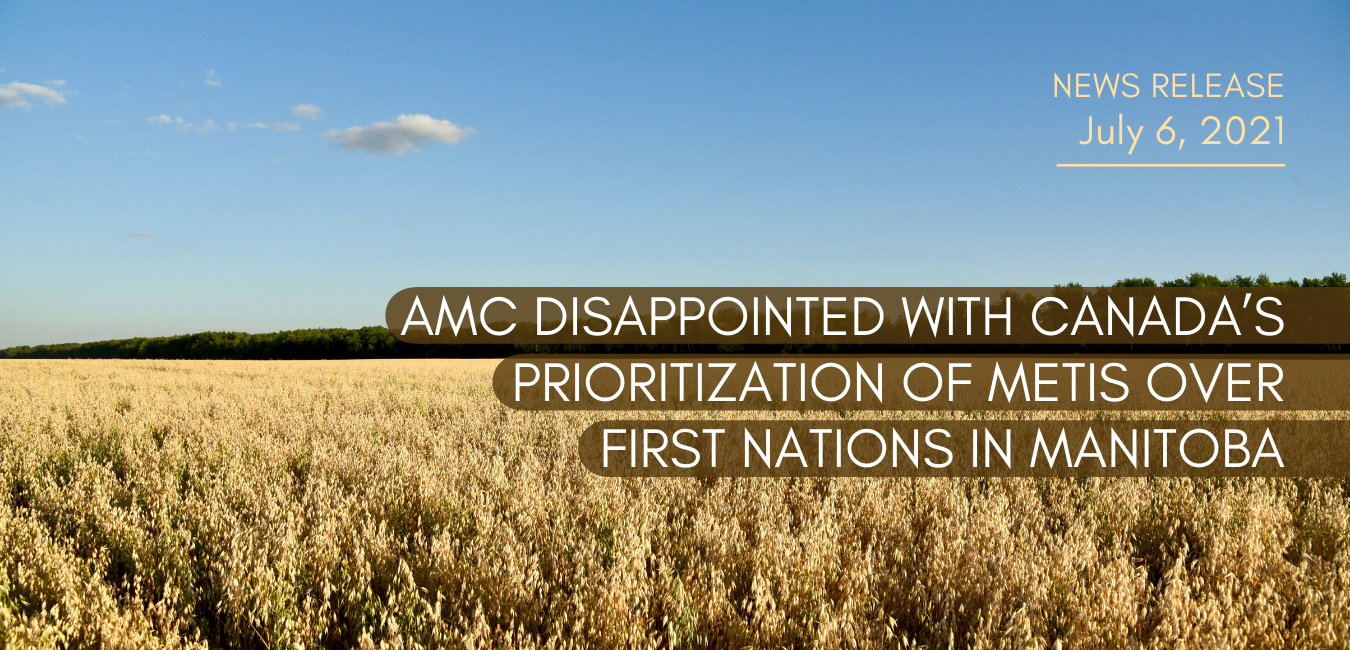AMC disappointed with Canada’s prioritization of Metis over First Nations in Manitoba

July 6, 2021
Treaty One Territory, Manitoba
alexpapineau
Treaty One Territory, Manitoba – The AMC expresses disappointment with Canada’s announcement of a new governance agreement with the Metis while ignoring Treaties made with First Nations in Manitoba.
AMC Grand Chief Arlen Dumas stated: “First Nations leadership in Manitoba have expressed alarm and concern that Carolyn Bennett, the Minister of Crown-Indigenous Relations will sign another agreement with the Metis in Manitoba without considering the implications to the inherent and Treaty rights of First Nations.”
Today, Minister Bennett signed the Manitoba Metis Self-Government Recognition and Implementation Agreement or what the Manitoba Metis Federation refer to as a “modern-day treaty” with the Manitoba Metis Nation. This is part of the government of Canada’s Recognition of Indigenous Rights and Self-Determination discussion tables. In Manitoba, there are nine First Nation discussion tables that involve 50 First Nations: Birdtail Sioux First Nation, Canupawakpa Dakota First Nation, Dakota Plains First Nation, Fisher River Cree Nation, Island Lake Tribal Council, Nisichawayasihk Cree Nation, Sioux Valley Dakota Nation, Treaty #2 First Nations Treaty #5 and Treaty #5 Adhesions First Nations. The Metis have claimed its “Metis homeland” covers all the Treaty and traditional lands of First Nations in Manitoba, Saskatchewan and Alberta, along with the interests of other First Nation in Ontario and the Northwest Territories.
Grand Chief Dumas stated, “While we recognize that section 35 of the Constitution Act, 1982 recognizes and affirms the existing rights of the Aboriginal peoples of Canada and that included the Metis, First Nations have yet to have those rights spelled out. As the original Treaty partners to the Crown, First Nations have yet to be given the right to self-governance matters such as citizenship, elections, and the unencumbered operations of their own governments. With the signing of this agreement, Canada has now clearly signalled it prioritizes the Metis over First Nations as the Liberal Party seeks a majority with another federal election looming nearer. This agreement ignores the First Nation tables and concerns that each First Nation would have with the Crown making agreements and arrangements with the Metis who claim rights and land that have existed long before the Metis came to be, and identified in our Treaties.”
The Crown-Metis agreement puts First Nations’ interests at risk, undermines the existing discussion tables, and leads to many more questions, specifically related to how this will affect First Nations’ Treaty and Aboriginal rights and existing agreements such as the 1997 Treaty Land Entitlement Framework Agreement.
Grand Chief Dumas continued, “First Nations in Manitoba have Treaties that go back a 100 years, and yet the Crown-Indigenous Relations Minister does not prioritize those discussions, and instead signs an agreement with the Metis who do not have the same Treaty relationship – but claim they have rights in all our First Nations’ treaty and traditional territories. As the United Nations Declaration on the Rights of Indigenous Peoples recognizes, First Nations have a right to be involved in discussions when it affects their rights and lands. Minister Bennett has decided that is not the case, even though the government rushed to pass Bill C-15 An Act respecting the United Nations Declaration on the Rights of Indigenous People before the summer recess and members of Parliament begin to campaign.”
Grand Chief Dumas concluded, “There are now a number of Metis self-government agreements signed with Canada over the last 2 years while First Nations are being taken to court when trying to defend their Treaty rights. Our relationship with Canada is with our Treaties. Therefore, I call on the Prime Minister to call for a First Ministers Meeting (FMM) and to initiate a process for constitutional change to address the unfinished business of the First Ministers Conference on Constitutional reform back in the 1980’s. If you want to apply the UNDRIP in creating a respectable and reciprocal working relationship with First Nations in Manitoba, you need to give life to Section 35 and the spirit and intent of our Treaties must be respected and the constitution amended accordingly with our consent.”